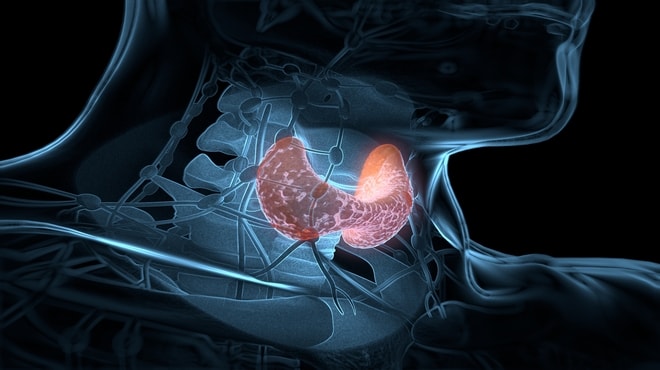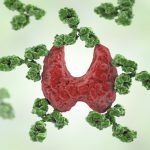Thyroid cancer is the cancer in the thyroid gland, an endocrine organ which produces hormones that control the speed of metabolism. Read more about thyroid cancer here.
Chemotherapy is not generally used for treating thyroid cancers, but it might be used to treat advances thyroid cancer, or cancer that has recurred. Chemotherapy is also used for certain clinical trials.
How chemotherapy is given for thyroid cancer?
Chemotherapy involves the usage of anti cancer drugs, medically known as cytotoxic drugs, to eliminate cancer cells. These drugs are circulated throughout the body in the bloodstream.
The drug is sent into the body through a drip into the arm. A small tube, known as a cannula, is inserted into one of the veins and is connected to the drip. A central line, which is a long plastic tube that helps in the flow of drugs into a large vein in the chest or the arm, is required to stay into the body for the entire duration of the treatment. Chemotherapeutic drugs are also taken orally.
Types of chemotherapeutic drugs for thyroid cancer:
Chemotherapy is often given in cycles. A rest period to recover from the side effects of the drugs is given after each cycle. These drugs are given alone or in combination with other drugs/treatments. Know more about the combinations of drugs used for chemotherapy here. Following are the approved chemotherapeutic drugs used for thyroid cancer are:
Doxorubicin:
Doxorubicin is a type of chemotherapy drug called anthracycline. It helps in blocking an enzyme called topoisomerase 2. Topoisomerase 2 is an enzyme which helps the cancer cells to divide and grow. With the lack of this enzyme, the growth of cancer cells stops, hence helping in the elimination of the cancer. Doxorubicin can also be combined with other chemotherapy drugs to increase its effectiveness.
Cisplatin:
Cisplatin is one of the chemotherapy drug.This chemotherapy drug kills cells,which divide rapidly, such as cancer cells. Cisplatin is usually used as a drip into your bloodstream in other words intravenously.however it can also be administered through a thin short tube called cannula. It is sent into a vein in arm every time treatment is done. A long line i.e, a central line, a PICC line or a portacath may also be used.
These are tubes made of plastic that take the drug into a large vein in your chest.the tube is put in place throughout the time period of the treatment of the thyroid cancer.
Other drugs commonly used for treating thyroid are:
- Cabozantinib-S-Malate
- Vandetanib
- Doxorubicin Hydrochloride
- Ipilimumab
- Lenvatinib Mesylate
- Sorafenib Tosylate
- Nivolumab
Side effects of chemotherapy in thyroid cancer:
Chemotherapy is a targeted treatment, which aims in killing the malignant cells. In this procedure, a lot of healthy cells are affected, because of which patients who are given chemotherapeutic drugs experience a lot of side effects. Following are the short term side effects of chemotherapeutic drugs:
- Fatigue
- Hair loss
- Sore mouth and throat
- Red or pink urine
- Loss of appetite
- Diarrhoea
- High body temperature and chills
- Sore eyes
- Abdominal pain
- Renal failure
- Hearing problems
- Lowered blood cell count leading to anemia, infections and easy bleeding
- Changes in the level of minerals in the blood
- Neuropathy
In most cases, the short term side effects go away post the recovery phase. Only in very few cases, they lead to further complications. The long term side effects are to be dealt with, for lifetime. However the intensity with which they affect the patients can be controlled and reduced by taking proper health care and regular check-ups with the doctor. On experiencing any of the side effects or other signs and symptoms, a doctor has to be consulted immediately.
Read more about concerns of thyroid cancer here.
Success rate and dosage with thyroid cancer:
The decision factor of dosage is the age and weight of the patients. The typical doses are measured as a fixed amount of milligrams for a kilogram of the person or base surface area which is a product of height and weight. However the dosage differs for children, elderly and hyper sensitive people for obvious reasons. Usually, chemotherapy is given as a course of several cycles of treatment. The number of cycles one has is dependent upon the treatment plan decided. Each cycle is of 3 or 4 weeks.with intake of drugs either every 3 or 4 weeks or once a week or every day over a 5 day period.
The patient may be prescribed a single drug or a combination of drugs which could potentially treat cancer such as different chemotherapy drugs or radiotherapy. Chemotherapeutic drugs are often used for metastasized cancers and have a good success rate in treating the thyroid cancers which could not be removed by surgeries. Chemotherapy is also combined with radiation therapy, this treatment is known as chemoradiation.
After care of chemotherapy for thyroid cancer:
Regular monitoring of the patients is compulsory during the treatment. A strict follow up with a healthy regime has to be followed by all the patients.
- Foods with unpleasant tastes have to be avoided
- Spicy and hot food are to be avoided
- Rest has to be taken
- Post treatment, dosage should be changed and monitored based on the tolerance levels.
- Have to take 6-8 small and healthy meals
- Must stay hydrated
- Take good skin care
- Blood transfusion is required in case of lower blood cell count
- All the medications being used must be prescribed the doctor only
- Avoid vaccinations
- In case of lowered hormone levels, infusion will be required post treatment
- The patients have to maintain a proper health record
- Patients who have received radioactive iodine therapy have to stay away from children and pregnant women for a couple of days
- Vitamin and minerals supplements are to be taken externally
- Patients are not advised to drive or do any other physical activities alone




